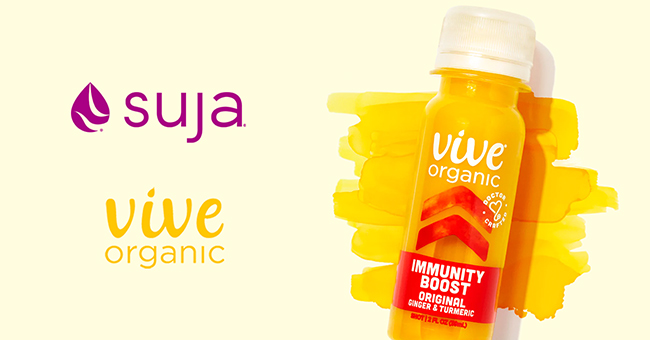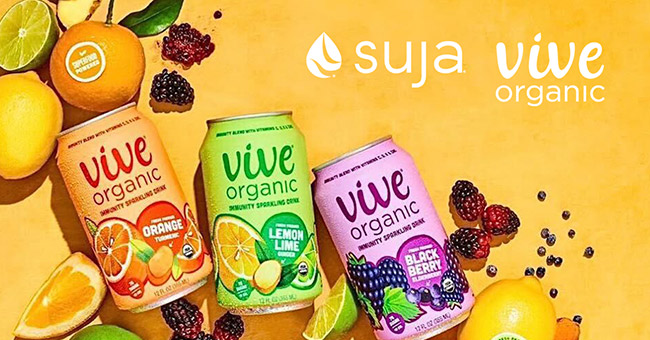Following its acquisition of Vive Organic, cold-pressed juice maker Suja is aiming to become a giant player in the 2 oz. shots space.
The two California-based companies announced yesterday that Suja has purchased Vive for an undisclosed fee, marking the first acquisition by Suja since it was itself acquired by private equity firm Paine Schwartz Partners last year. The deal marks a marriage between two direct competitors in the fast-growing functional shot category.
Moving ahead, Suja and Vive will continue to act as separate brands under the same parent organization, and Suja CEO Bob DeBorde said the combined company will control over half of the U.S. cold-pressed juice shot market.
“The consumers are naturally moving toward high-function, low-sugar beverages and the shots fulfill that need, and even compete kind of in the vitamin and mineral supplement space,” DeBorde told BevNET. “So with that, there’s a lot of growth ahead and we believe that the two companies together can help achieve that faster. Scale matters, and having the scale and the access to consumer research, the access to the operational scales that we’ll get together – the sales team, the marketing team, etc, – we believe we can drive the category to the next level.”
According to DeBorde, Vive’s operations will be fully integrated into Suja over the coming months, but the two companies will continue to run independently for at least the rest of 2022 as they determine the best way to combine the teams.
Suja currently manufactures its products in its own 200,000 square foot production and toll processing facility in Miramar, California, but it was not immediately clear if or how production of Vive products will be integrated.
While Suja and Vive frequently compete in the same sets in conventional and natural channel accounts, DeBorde said the acquisition will help fill distribution gaps for both brands; Vive now gives Suja a shot presence in Whole Foods stores, while Suja offers Vive a relationship with Publix, for example. Mainly, the acquisition is about driving incremental growth, he said, and the company has no plans to swap out product lines or place both brands in accounts where it doesn’t make sense.
Instead, Deborde, a former VP of field operations at Coca-Cola, said Suja and Vive will focus on away-from-home use occasions by targeting new channels like convenience, travel, colleges and universities, offices and hospitals, to name a few.
“I know from my time at Coke on the sales side, we probably spent a big portion of our efforts really just growing the away-from-home world and different beverage occasions, and that’s a huge opportunity for both Vive and Suja going forward,” he said.
The company also isn’t concerned about potential cannibalization. Vive co-founder and CEO Wyatt Taubman noted that although they do compete, he said they have distinctive brand identities and positions, with Suja serving as a “high-quality, wide-ranging, tasty and multi-functional” product at an accessible price point, while Vive is a pure premium play representing “the holistic wealth journey.”
“Both brands are certainly complementary in shared values and in the shared mission, but they do play very distinct roles for consumers, from differences in flavor profiles, function and price points,” he said. “So taking a dual brand approach will help us drive growth for the category and continue to to really drive the category forward.”
The deal comes over a year after Suja was acquired by private equity firm Paine Schwartz Partners in July 2021, during which time the brand has continued to focus on driving sales and expanding within a shifting juice category where many of Suja’s former HPP rivals like Blueprint and Daily Greens have gone out of business, while conglomerates like Coke and Pepsi have moved away from the space by divesting brands such as Odwalla and Naked.
At one point, Coke was a 33% stakeholder in Suja with an option to buy it outright, but the conglomerate allowed its deadline for an acquisition to expire.
Under Paine Schwartz and the leadership of DeBorde, who first assumed the CEO position on an interim basis in 2019, Suja has reported double-digit sales growth in retail. According to IRI, sales of the brand’s products categorized as refrigerated fruit drinks were up 28.6% to over $61 million in the 52-weeks ending August 7, while its refrigerated vegetable juices grew 23.6% to $45.1 million, blended fruit juices rose 11.6% to $11.2 million, juice and drink smoothies increased 48.1% to $6.1 million, and energy shots increased 12.7% to $1.6 million.
Meanwhile, Vive Organic products classified as refrigerated fruit drinks grew 939.1% to about $3 million and its energy shots were up 144% to $874,753 in the same period.
DeBorde said the ultimate goal of expanding Suja’s portfolio is increasing household penetration for not just shots, but cold-pressed juice as a whole, noting that pasteurized brands like Naked and Bolthouse have significantly higher consumer awareness. He said the company will “double down” on its investments in sales and marketing in order to fuel growth going forward.
Vive also brings one more emerging category into Suja’s portfolio with its functional soda line, Sparkling Immunity. Taubman said the brand is taking a “test and learn” approach to the line, but is aiming to scale it next year.
“That is one of the things that we will be embarking on, is really growing the household penetration and brand awareness, as well as the buyer rate going forward,” DeBorde said. “I think we have a lot of tailwinds on that mostly because consumers are naturally looking for those low-sugar, high-function items and the shot category particularly has filled that need so far – just not enough people know about it.”

